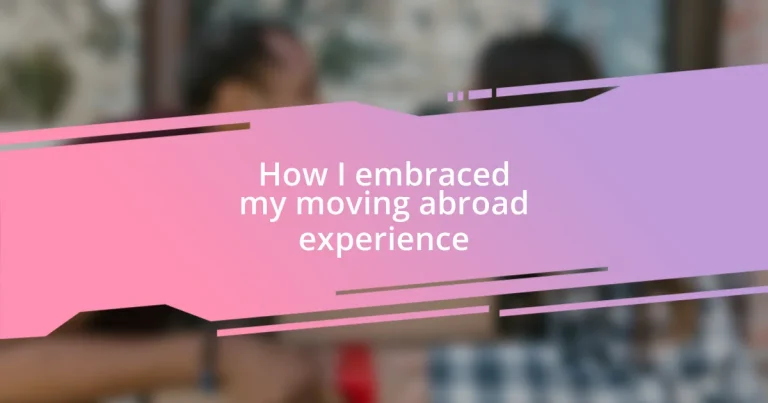Key takeaways:
- Preparation for moving abroad involves emotional reflection, cultural research, and building connections before departure, transforming anxiety into excitement.
- Understanding local culture through participation in community events and language exchanges fosters a sense of belonging and enriches the experience.
- Managing practical aspects like legal requirements, finances, and social networking is crucial for a smoother transition and overall fulfillment in a new environment.
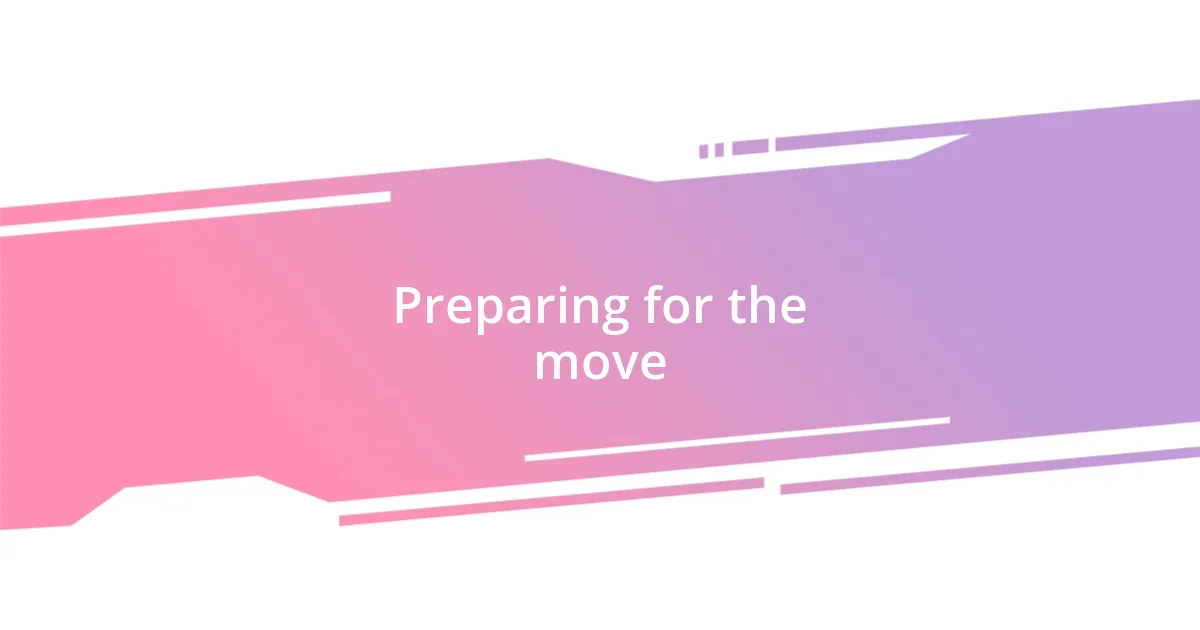
Preparing for the move
Preparing for a move abroad can be both thrilling and overwhelming, and I distinctly remember my mixed emotions during this phase. Each day felt like a whirlwind of packing, organizing, and trying to beat the clock. Have you ever found yourself wondering if you’re really ready to leave everything familiar behind?
As I sifted through my belongings, I encountered many memories—photos, gifts, even that old concert ticket. Letting go was painful, yet liberating; it was my way of making space for new adventures. I often asked myself, “What truly matters as I step into this unknown?”
In the midst of the chaos, I dedicated time to research my new home. I explored local customs, learned a few language phrases, and even connected with locals online. This preparation gave me a sense of belonging before I had even arrived, turning my anxiety into excitement. Isn’t it interesting how preparation can transform our perspective on a significant life change?
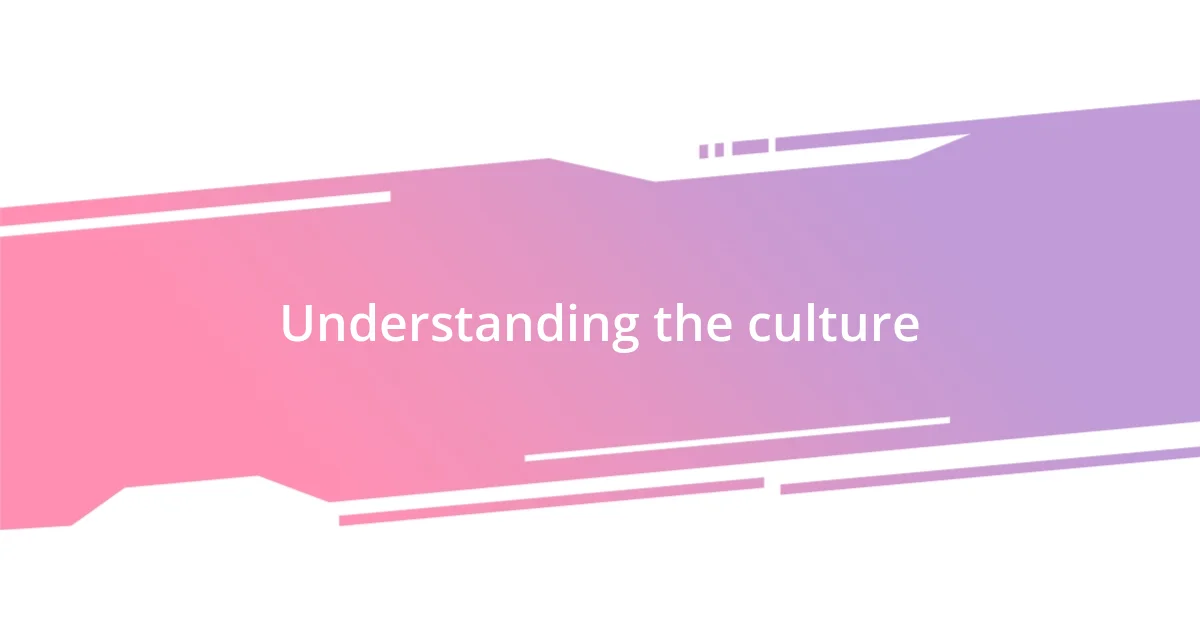
Understanding the culture
When I first arrived in my new country, I felt like a fish out of water. Everything was different—the food, the language, the way people interacted. I remember the first time I tried to order coffee at a local café, fumbling with my basic language skills. That moment taught me that understanding the culture goes beyond just learning a language; it’s about grasping the nuances of daily life, too. For instance, I realized that greetings were not just formalities; they conveyed warmth and connection, something I had to adapt to.
To immerse myself fully, I made it a goal to dive deep into local customs and traditions. Here’s what I discovered:
- Participating in local festivals helped me appreciate the community spirit.
- Joining cooking classes offered insights into cultural values around food.
- Attending language exchange meetups connected me with some amazing people.
- Reading local literature enriched my understanding of the society’s history and values.
These experiences not only broadened my cultural horizons but also gave me a sense of belonging in my new environment. Each small engagement made me feel, little by little, that I was weaving myself into the fabric of the community.
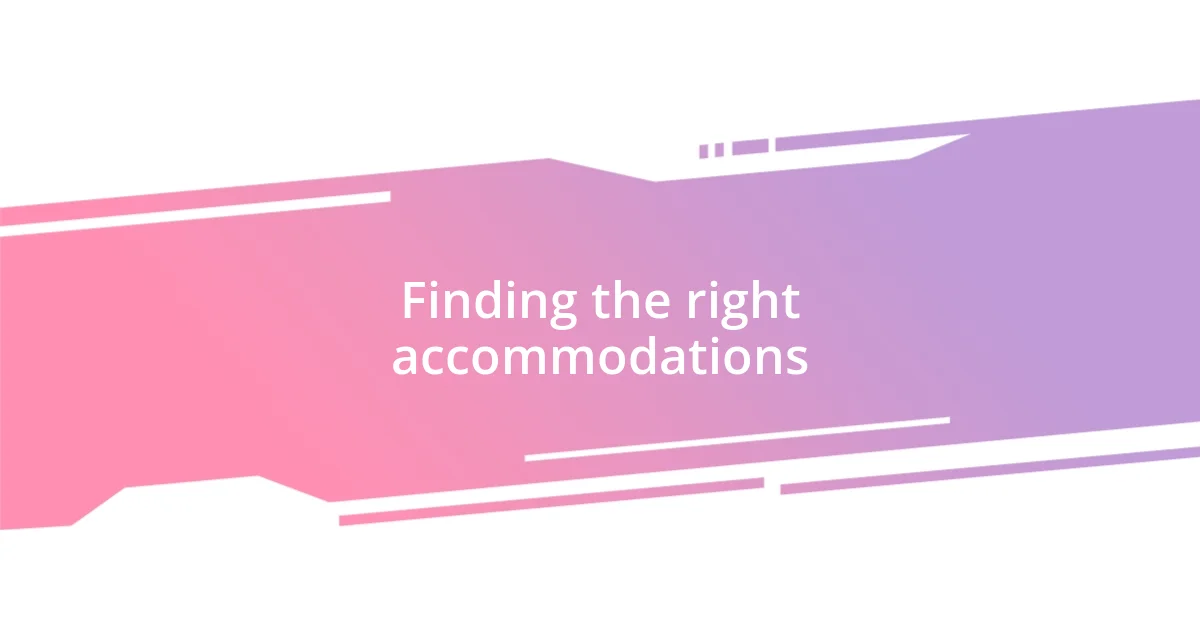
Finding the right accommodations
Finding the right place to call home in a foreign country can be one of the most pivotal steps in your moving experience. I still recall the overwhelming feeling when browsing through countless listings online, trying to find not just any accommodations, but somewhere that felt right. Did I want a cozy apartment in the city center or a tranquil place on the outskirts? Each option came with its pros and cons, making the decision feel monumental.
After hours of exploring, I remembered a tip a seasoned traveler once shared: “Trust your instincts.” It was a simple yet profound piece of advice. I scheduled viewings and took note of how the spaces made me feel. The energy of each place told a story. One place had sun streaming through the windows, filling the space with warmth, while another felt cold and uninviting. These small details mattered deeply; they would shape my day-to-day experiences in my new life.
When I finally settled on a studio that ticked all the boxes, I felt an immense wave of relief. The location was perfect, close to my favorite park and vibrant cafes. But more importantly, it felt like a welcoming embrace. I decorated it gradually, each piece reflecting my journey and dreams, transforming it into a sanctuary. Finding the right accommodation was not just about the physical space; it was about cultivating an emotional connection to my new home.
| Accommodation Type | Pros and Cons |
|---|---|
| Apartment in City Center | Pros: Convenient access to amenities, vibrant atmosphere; Cons: Higher costs, noise levels |
| Shared Housing | Pros: Lower rent, opportunities to make friends; Cons: Less privacy, potential conflicts |
| Suburban Home | Pros: More space, peaceful environment; Cons: Commuting time, fewer local services |
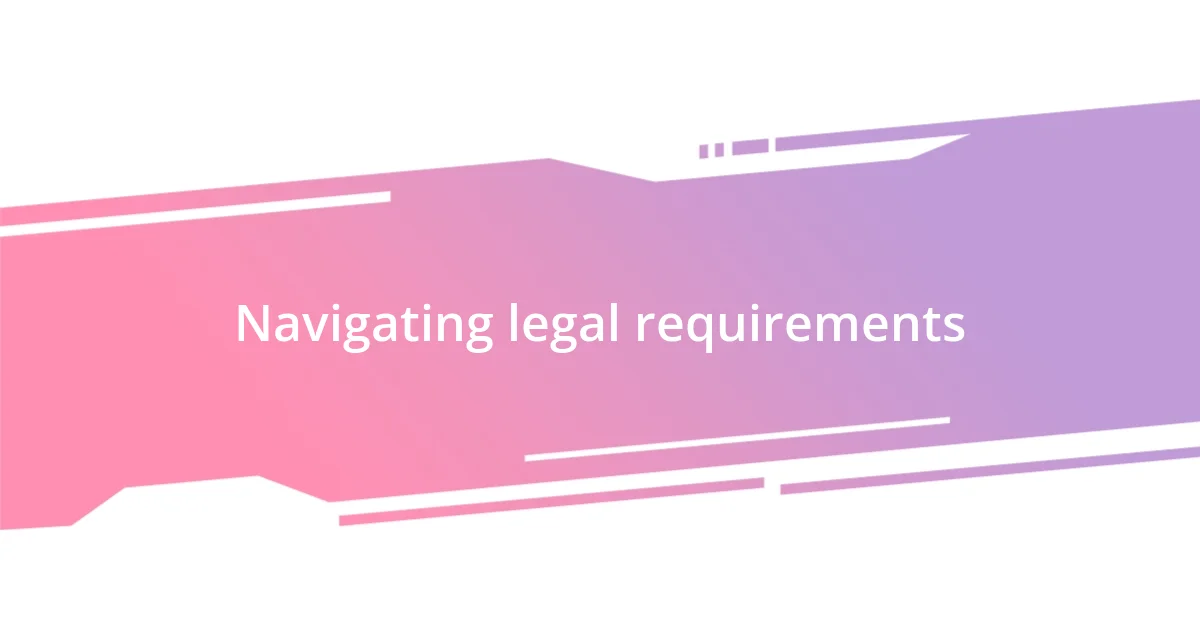
Navigating legal requirements
Navigating the legal requirements of moving abroad can feel like unraveling a complicated puzzle. I remember the sheer anxiety I felt when tackling visa applications and residency permits. Why did it seem that every country had its own sets of regulations? The key for me was to thoroughly research the specific legalities well before my move. I spent hours on official government websites and forums, making sure I had checked each box—no one wants to be caught off guard by unexpected paperwork after arriving.
When I finally submitted my visa application, I felt an overwhelming mix of hope and anxiety. Would my documents be accepted? I meticulously organized everything, feeling each piece of paper represented a step closer to my new life. I even found it helpful to join online expat groups; hearing from others who had navigated similar processes gave me reassurance. I remember one member sharing a story about how they were nearly denied entry because they misplaced a crucial document. It was a sobering reminder that attention to detail is paramount.
Once the legal pieces were in place, my relief was palpable. It was as if a weight had lifted off my shoulders, allowing me to focus on the excitement of my new adventure. I remember standing outside the immigration office, visa in hand, flooded with a sense of accomplishment. This journey taught me not just the importance of preparation, but also how navigating legalities can shape your experience abroad and pave the way for a smoother transition into your new life.
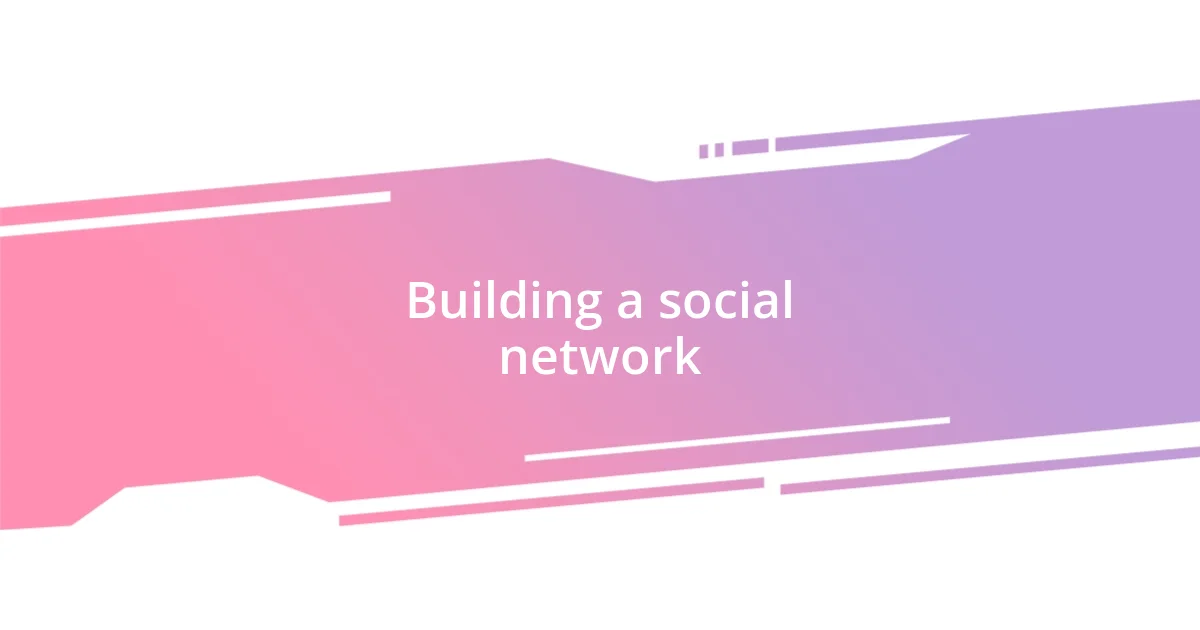
Building a social network
Building a social network in a new country can often feel like wandering through a maze. I still vividly remember my first visit to a local café, where I found myself glued to my notebook, nervously glancing around at people who seemed to know each other so well. It hit me—how would I break through that invisible barrier? The answer came unexpectedly; it was about being open to new experiences, even if it meant stepping outside my comfort zone.
While I was settling in, I stumbled upon a community group that organized weekly meet-ups. Initially, I hesitated—what if no one liked me? But gathering my courage, I showed up anyway. That evening changed everything for me. I connected with fellow expats who shared similar challenges and triumphs. We laughed over our mishaps, swapped advice, and suddenly, I felt less alone. Isn’t it amazing how a simple conversation can spark a connection that turns strangers into friends who feel like family?
As I continued to expand my circle, I tried attending local events, which proved to be invaluable. From cooking classes to language exchanges, each experience was a stepping stone in building my social network. I learned that every nod or smile exchanged could lead to an invitation or a captivating discussion. It’s in these moments that I realized the beauty of embracing vulnerability; sometimes, all it takes is that first step to make a connection that enriches not only your social life but your entire experience abroad.

Managing financial aspects
Managing your finances while moving abroad can feel like a daunting task. I remember my initial panic over currency exchanges and budgeting in a foreign economy—what if I ran out of money before settling in? To tackle this, I opened a local bank account right away, which significantly eased the stress. Having a local account allowed me to avoid hefty transaction fees that can really add up over time, and it provided me with immediate access to funds in the local currency.
I also took the time to create a comprehensive budget that accounted for both expected expenses and potential surprises. There were moments when unexpected costs cropped up, like those endless appliance delivery fees or higher-than-expected utility bills. Keeping a detailed tracking system helped me adjust and find areas where I could save, which, believe me, was invaluable. I learned to prioritize and reassess my spending regularly—it became a habit that ultimately led to peace of mind.
Finally, I sought advice from local expats about financial pitfalls to avoid. One insightful tip revolved around health insurance; I never realized how costly it could be if you weren’t adequately covered. Did I feel overwhelmed in those early discussions? Absolutely! But the guidance of others transformed my approach and made me feel included in a community that valued financial savvy. Reflecting now, it’s clear that managing finances doesn’t just protect your budget—it enriches your journey by allowing you to make the most of your time abroad.
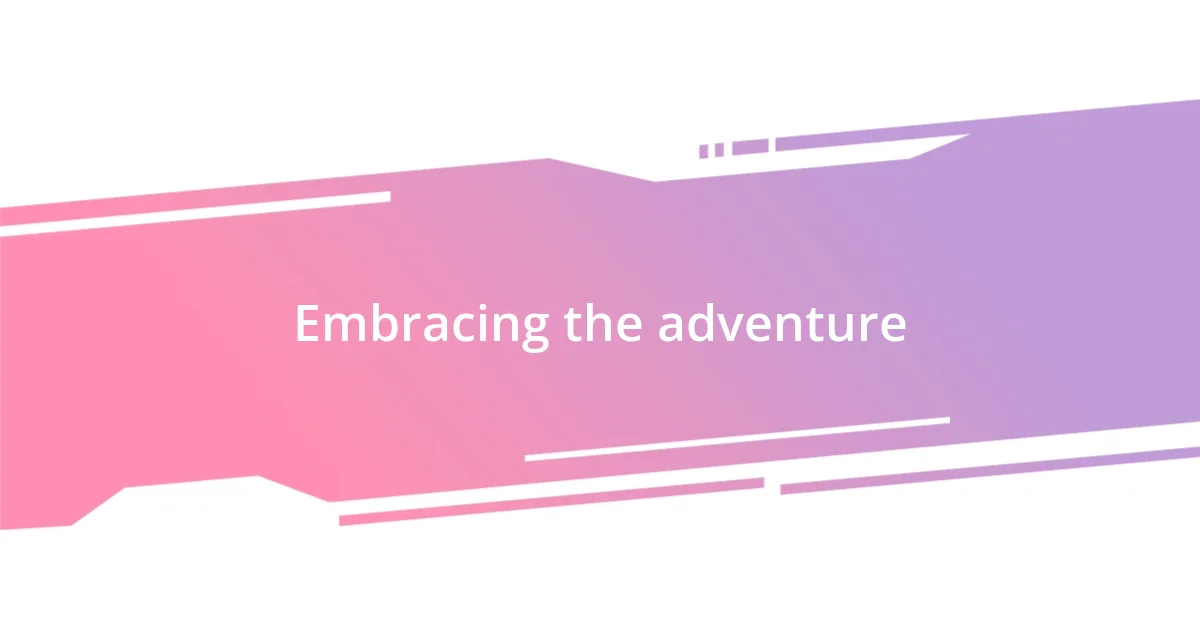
Embracing the adventure
Embracing the adventure of moving abroad has been nothing short of exhilarating. I remember the first time I boarded the plane, a mix of excitement and anxiety swirling in my stomach. With every mile, I could feel my old life fading away, replaced by the thrilling unknown. Isn’t it incredible how stepping into the unfamiliar can ignite a sense of freedom? It’s an opportunity to reinvent yourself, a thought that fueled my excitement during those early days.
As I explored my new city, I found myself eagerly wandering through streets lined with unfamiliar sights and sounds. One memorable day, I stumbled upon an open-air market bursting with colors and aromas. I felt a rush of energy, as if every fruit, spice, and stranger whispered a story waiting for me to discover. These spontaneous adventures became vital pieces of my experience abroad, reminding me that life truly starts at the end of your comfort zone.
I quickly learned that embracing the adventure also meant accepting the unpredictability that came with it. There were days when I felt lost or frustrated, my courage wavering. Yet, in those moments, I made a conscious decision to lean into discomfort rather than shy away from it. I often asked myself, “What if this unexpected detour leads to something amazing?” And you know what? More often than not, it did. That shift in mindset transformed not only how I approached challenges but enriched my entire journey, turning every setback into a stepping stone for growth.












